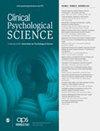How Idiographic Methodologies Can Move the Clinical-Science Field Forward to Integrate Personalized Treatment Into Everyday Clinical Care and Improve Treatment Outcomes
IF 4.1
2区 医学
Q1 PSYCHIATRY
引用次数: 0
Abstract
The research–practice gap refers to the fact that most evidence-based treatments created by researchers are not used in routine clinical care, which affects real-world treatment outcomes negatively. One key reason that evidence-based care is not used more frequently is its nonpersonalized format. For example, most evidence-based treatments are based on averages and are limited in addressing comorbidity, heterogeneity, and the needs of clients with minoritized identities. These limitations reduce therapist uptake of evidence-based treatment at large. As a result, most patients seeking treatment in community settings do not receive evidence-based care, which could more quickly and effectively reduce mental-health suffering. Furthermore, even clinicians who want to engage in evidence-based practice must still rely on their clinical judgment in decision-making when treatments fail to address client-specific needs. This reliance on decision-making can influence outcomes negatively. We propose that idiographic (i.e., one-person; N = 1) methodologies (data analysis of one person’s data) combined with digital mental-health technology could help reduce the research–practice gap and improve treatment outcomes. In this article, we outline the many issues contributing to these problems and how idiographic methods of personalization can address these issues. We provide an overview of idiographic methodologies and examples of how to use these methods to personalize existing evidence-based treatments with patients. Finally, we conclude with recommendations for future research and movement within the field that is needed to propel this type of personalization into routine clinical care to reduce the research–practice gap and improve treatment outcomes broadly.影像学方法如何推动临床科学领域的发展,将个性化治疗融入日常临床护理并提高治疗效果
研究与实践之间的差距指的是,研究人员创造的大多数循证治疗方法并没有在常规临床护理中使用,这对现实世界的治疗效果产生了负面影响。循证医疗没有被更多使用的一个重要原因是其非个性化的形式。例如,大多数循证治疗都是基于平均值,在解决合并症、异质性和具有少数民族身份的客户的需求方面存在局限性。这些局限性在很大程度上降低了治疗师对循证治疗的接受程度。因此,大多数在社区环境中寻求治疗的病人并没有得到循证治疗,而循证治疗可以更快、更有效地减少心理健康的痛苦。此外,即使是希望参与循证实践的临床医生,当治疗无法满足客户的特定需求时,也必须依靠自己的临床判断来做出决策。这种对决策的依赖会对治疗结果产生负面影响。我们建议,特异性(即一人;N = 1)方法(对一人的数据进行分析)与数字心理健康技术相结合,有助于缩小研究与实践之间的差距,改善治疗效果。在本文中,我们将概述造成这些问题的诸多因素,以及个性化特异功能方法如何解决这些问题。我们概述了特异性方法,并举例说明了如何使用这些方法与患者一起个性化现有的循证治疗。最后,我们对该领域未来的研究和行动提出了建议,这些研究和行动是推动这种个性化治疗进入常规临床护理所必需的,从而缩小研究与实践之间的差距,广泛改善治疗效果。
本文章由计算机程序翻译,如有差异,请以英文原文为准。
求助全文
约1分钟内获得全文
求助全文
来源期刊

Clinical Psychological Science
Psychology-Clinical Psychology
CiteScore
9.70
自引率
2.10%
发文量
35
期刊介绍:
The Association for Psychological Science’s journal, Clinical Psychological Science, emerges from this confluence to provide readers with the best, most innovative research in clinical psychological science, giving researchers of all stripes a home for their work and a place in which to communicate with a broad audience of both clinical and other scientists.
 求助内容:
求助内容: 应助结果提醒方式:
应助结果提醒方式:


